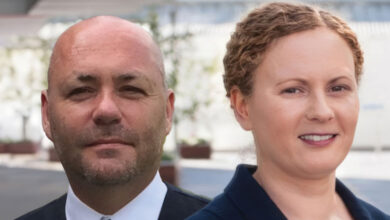Taking responsibility for a shared future
 Sharing Northern Ireland’s future is central to its future prosperity, Duncan Morrow writes.
Sharing Northern Ireland’s future is central to its future prosperity, Duncan Morrow writes.
This generation in Northern Ireland has been given a golden opportunity: to shape a future that works. For decades, attempts at building an economy were all-but destroyed by the ever-turning cycle of hostility
What we got was what we have: a public sector economy overly dependent on subvention, but enough to keep most heads above water. What we did not get were visitors, students or investment on anything like the right scale. So our tourist industry was a tenth the size of that in the South. We exported more educated 18-year olds than any other part of Britain or Ireland and got fewer back in return. And investors found better places to go.
Not that we lacked sympathy. Indeed, it is hard to identify a conflict anywhere in the world that drew greater sympathy. At the last count, the European Peace Programme had spent over £2 billion here and the International Fund for Ireland had topped £630 million. But too often it was pity not hope which we asked for and got.
The achievement of shared government took its time. But having got there, it is crucial that we seize the opportunity it creates and don’t mistake symbol for success. In spite of achievement, the poison of memory and suspicion is a potent legacy. If the time for action is not now, then when?
The focus of programmes for government on economic reform and building prosperity is both necessary and right. Yet no serious government can afford to pretend that this means more of the same. Modern economics depends on being attractive: being attractive to investors in a world where everyone is begging for attention, being attractive to the brightest and best so that new jobs can be secured, and being attractive for the visitor.
Some of that is about tax and costs. And some of it depends on the quality of the environment and a sense of safety or on the quality of education and on the cultural life of our cities. All of these things have to do with tackling violence and hostility and growing an outward and forward looking community. Sectarianism drives away entrepreneurs, violence is a catastrophe for tourism, and capital was always a coward and has lots of places to put its cash.
At its core, building a truly shared future is crucial not only because it is right but because it is wise. The opportunities which peace brings are already visible: National Geographic and MTV are signs of serious change. Likewise, the City of Culture project could be the driver that turns Derry and Londonderry into the new Galway of the north west, a site for high tech and high spec industry, a magnet for the young and the hub of tourism for one of the most stunning parts of these islands.
But none of this will happen by wishing the past away. The happy-clappy rhetoric of shared future always means the hard work of confronting and acknowledging serious issues. The temptation to declare the past over may seem serious in the suburbs but it is ignorance at the interface. Ending hostility means facing the legacy of threat and fear that makes too many places no-go for too many people.
City centre economies won’t thrive unless they are open, safe and shared. Walls won’t come down by wishing and riots won’t stop if we keep on ramping up the rhetoric. More importantly, saving services and keeping village schools depends on learning to share resources not on building parallel and hostile worlds.
In a time when austerity is eating in to an economy dependent on state aid and grants, the choice of shared or scared future is no small matter. The words of the Programme for Government give hope that sharing the future is no longer an add-on or extra but is a central part of good government for now. If it is not, then releasing an economy that works will still be tomorrow’s project.
Duncan Morrow, a former Chief Executive of the Community Relations Council, now lectures at the University of Ulster.





